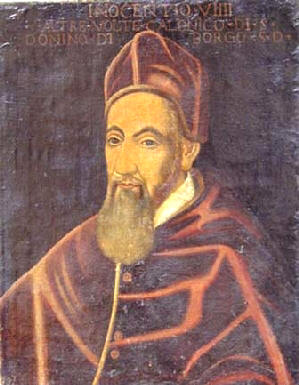 Innocent
IX, né Giovanni Antonio Facchinetti (July
22, 1519 – December 30, 1591), who was born to a
modest working family in the mountainous comune
of Cravegna, in the diocese of Novara, northern
Italy, was a canon lawyer, diplomat, and
chief administrator during the reign of Pope
Gregory XIV. He succeeded Gregory as pope on
October 29, 1591, but died on December 30 of the
same year. His pontificate was too short to be
eventful, but the career that led to his
election may be examined.
Innocent
IX, né Giovanni Antonio Facchinetti (July
22, 1519 – December 30, 1591), who was born to a
modest working family in the mountainous comune
of Cravegna, in the diocese of Novara, northern
Italy, was a canon lawyer, diplomat, and
chief administrator during the reign of Pope
Gregory XIV. He succeeded Gregory as pope on
October 29, 1591, but died on December 30 of the
same year. His pontificate was too short to be
eventful, but the career that led to his
election may be examined.Facchinetti was a lawyer, a graduate in 1544 of the University of Bologna, which was pre-eminent in jurisprudence, and became secretary to Cardinal Nicolò Ardinghelli before entering the service of Cardinal Alessandro Farnese, brother of the Duke of Parma and nephew of Pope Paul III, one of the great patrons of the time. The Cardinal, who was archbishop of Avignon, sent Facchinetti there as his ecclesiastical representative and subsequently recalled him to the management of his affairs at Parma, where he was acting governor of the city, from 1556-1558. In 1560 Facchinetti was named Bishop of Nicastro in Calabria, and in 1562 was present at the Council of Trent. Pius V sent him as papal nuncio to Venice in 1566 to further the papal alliance with Spain and Venice against the Turks, which ultimately resulted in the victory of Lepanto in 1571. Relinquishing his see to pursue his career in Rome, he was named titular Latin Patriarch of Jerusalem in 1572.
During the reign of the sickly Gregory XIV, who suffered from bouts of malaria, the burden of the papal administration rested on his shoulders. Even before Gregory breathed his last, Spanish and anti-Spanish factions were electioneering for the next pope. Philip II of Spain's highhanded interference at the previous conclave was not forgotten: he had barred all but seven cardinals. This time the Spanish party in the College of Cardinals did not go so far, but they still controlled a majority, and after a quick conclave they raised Facchinetti to the papal chair. Mindful of the origin of his success, he supported, during his two months' pontificate, the cause of Philip II of Spain and the Catholic League against Henry IV of France in the civil Wars of Religion, where a papal army was in the field. Death, however, did not permit the realization of Innocent's schemes.
His great-nephew Cardinal Giovanni Antonio Facchinetti de Nuce, juniore, was one of two cardinals appointed during the weeks of his pontificate. A later member of the Cardinalate was his great-grand-nephew Cesare Facchinetti (made a Cardinal in 1643).

